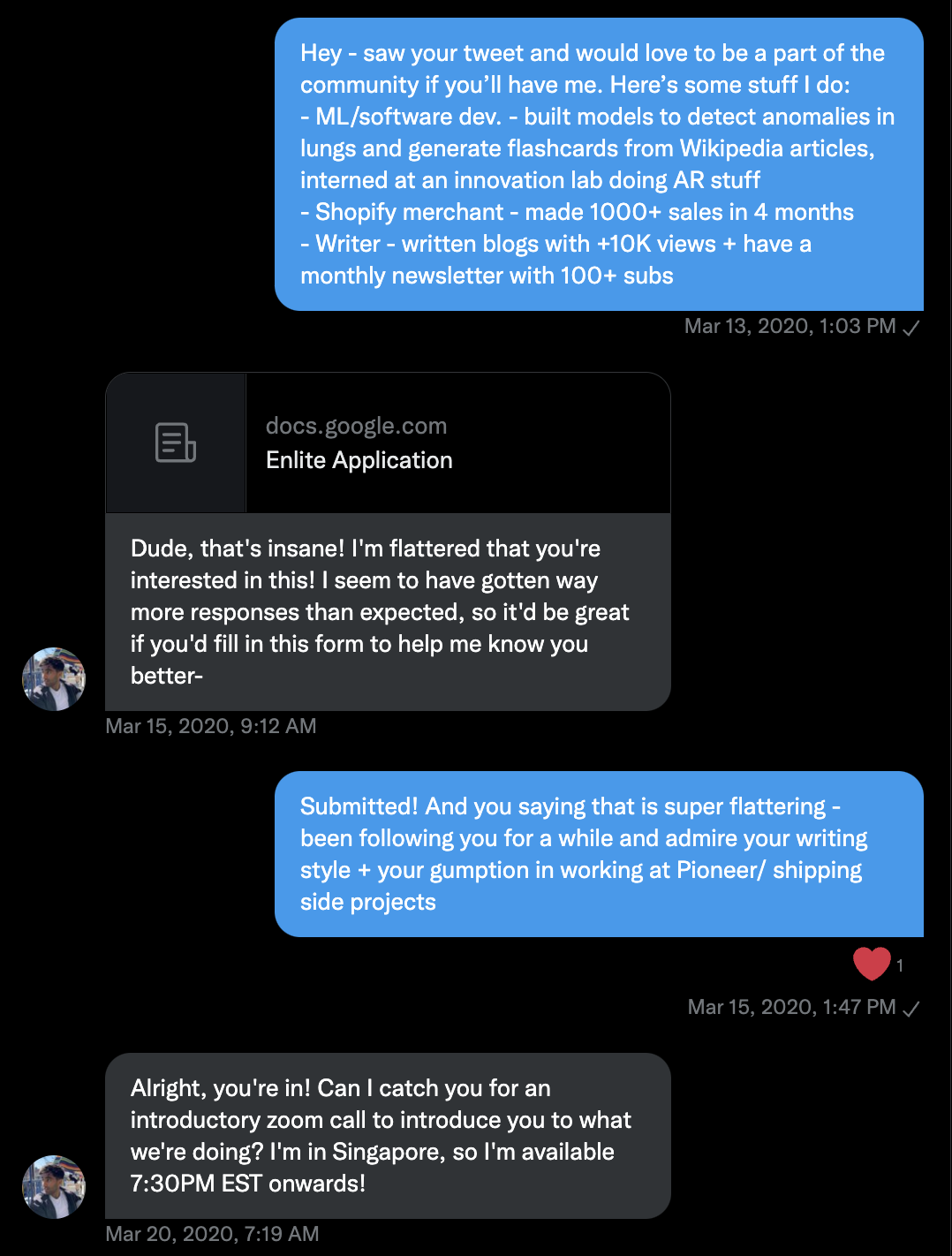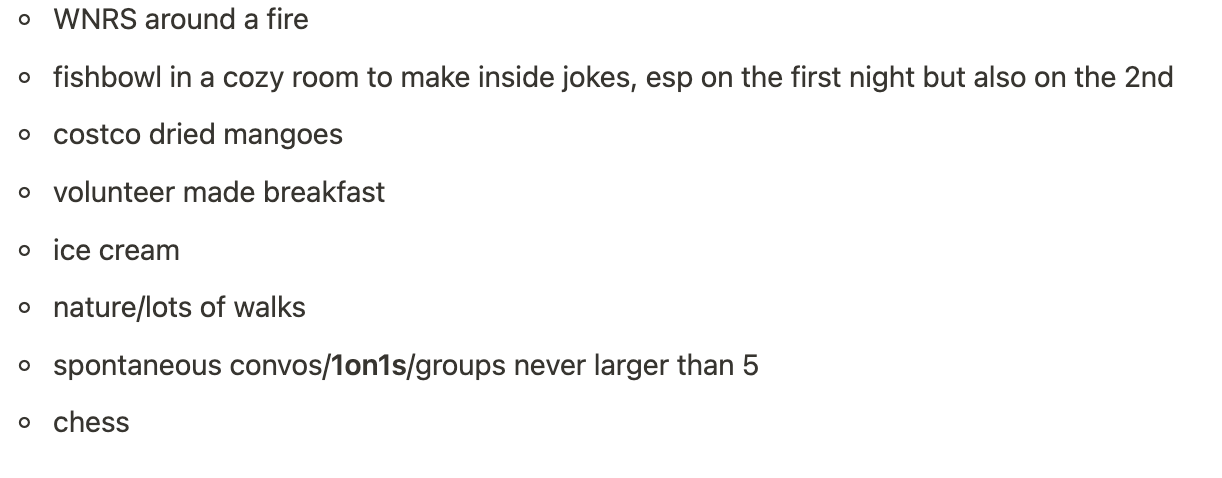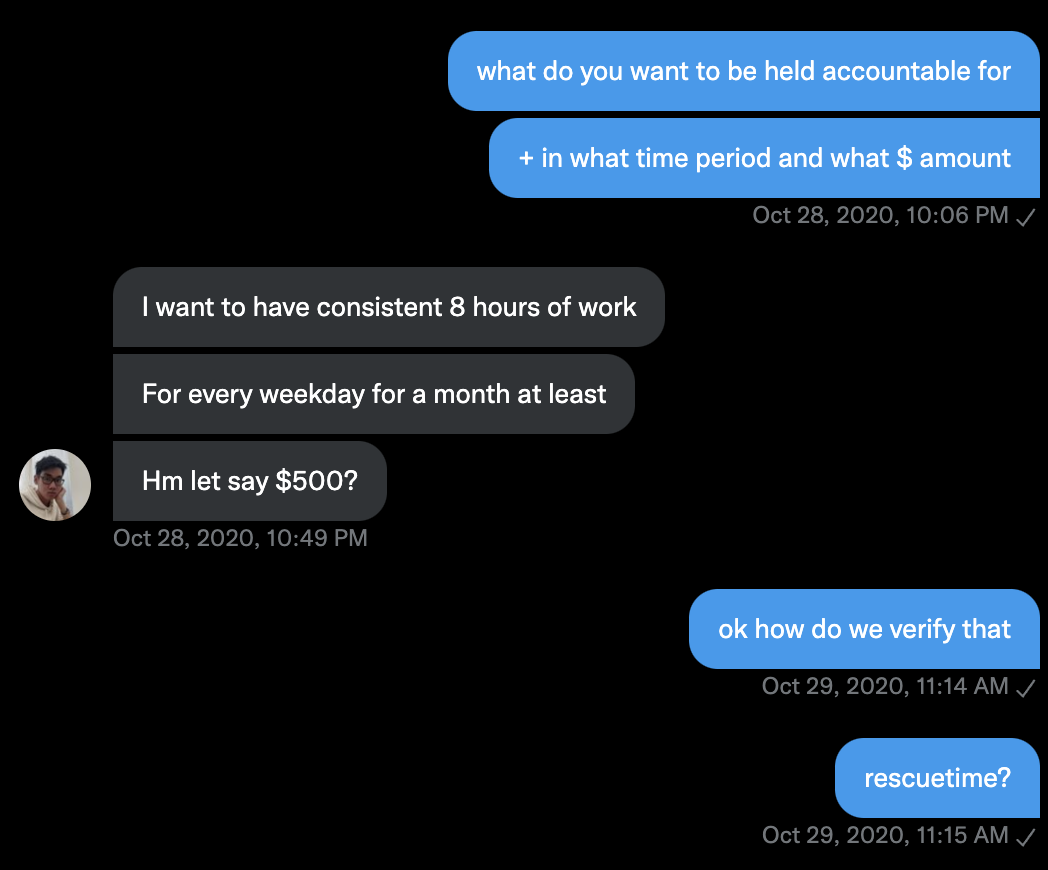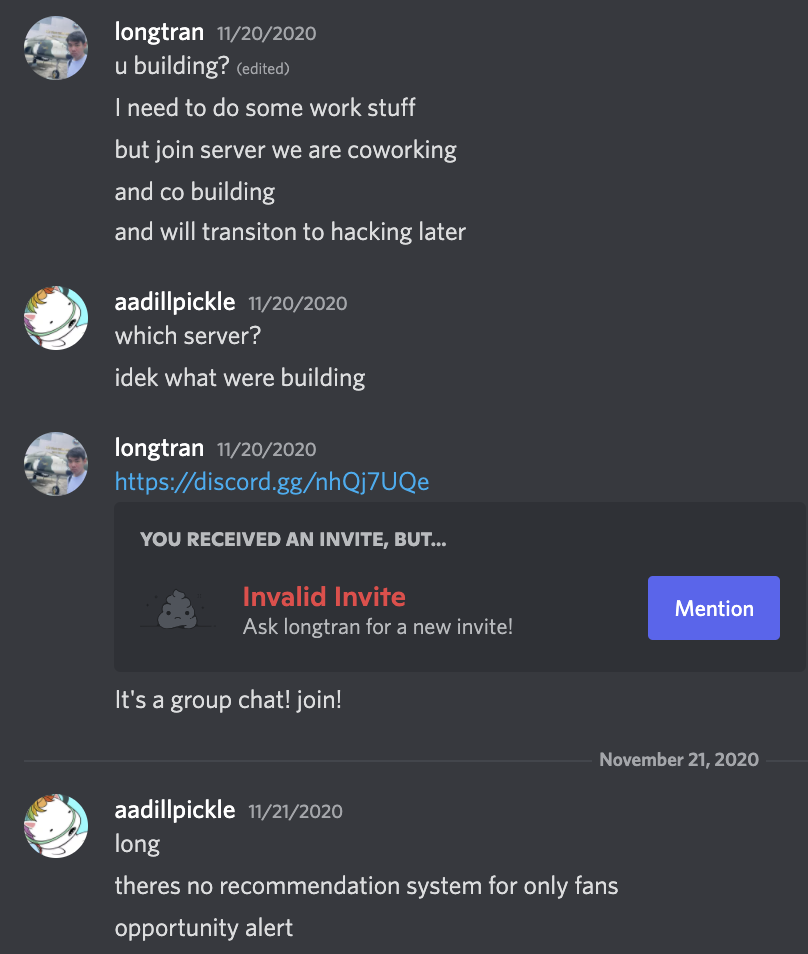An extremely opinionated guide on making friends for people who are exactly like me
Stage 1: Meeting people who you’re likely to be friends with
Most friends during your childhood are going to be circumstantial. You didn’t really choose where you went to school K-8 because you didn’t really choose the town you lived in or the area your parents moved to. You maybe went to the gifted program in elementary or the IB program in high school and you maybe did clubs relevant to your interests. But, for the most part, the friends you made just happened to be the people you saw everyday and you guys weren’t bonded by much more than circumstance.
For me, I really started thinking intentionally about who I wanted to be around at around 16 but revamp the criteria about every year as my identity and values change. A couple things have worked for me:
- Joining (online) communities
- TKS: I got really lucky by joining the second year it existed — I met most of my best friends there and there was a culture of going out of your way to intentionally meet and develop close relationships with others through “braindates” (like dating but with… brains)
- Enlite: When the pandemic hit, I started using twitter a lot more and found that there were so many cool ambitious teenagers I seemed to have a lot in common with. One of them tweeted about starting an online learning community where I met some of the most gracious couchsurfing hosts and interesting shennanigan do-ers — one DM set off the internet strangers → best friends pipeline ❤️

- MFC: I tweeted this and this crazy guy actually took me up on it for $500 over a month. We chatted over twitter DM, had a lot in common and eventually he adds me to a Discord server to hack on a project (anonymous appreciation twitter bot) that led to me meeting some friends I’m pretty sure will be around for life
- What all these communities have in common is:
- a bunch of smart, curious, interesting, and ambitious people who don’t know many others like them outside of the community — this leads to more buy-in to be an active member
- a culture of really wanting to meet up often and help each other out
- I’m not sure how to replicate this but I have seen them deteriorate somewhat through growth so my hypotheses lie around avoiding growth by:
- encouraging and providing opportunities for 1-1 relationships (the university program I was in was notoriously bad at this — all their events were group based)
- keeping communities small (TKS was about 150 when I was in it, I was friends with about 5-20 people, early Enlite was around 10-15, early MFC was about 20)
- be really selective with filtering + use interviews/vetting by community members
- Twitter
- The important communities I joined were mainly downstream of Twitter, which I got into due to pandemic induced loneliness and this blog post. To use twitter effectively to make friends:
- Follow who you think is cool and unfollow what’s in anyway harmful, relentlessly
- Tweet whatever you think of that’s somewhat witty/interesting/insightful/important/funny (WIIIF) and things you’re making – showcase your personality, build in public but more so be yourself in public
- Reply to and DM people you think have tweets that are WIIIF — don’t expect anything in return/to hop on a call, just treat them like an old friend and have conversations and eventually maybe work on projects/play games with them
- The important communities I joined were mainly downstream of Twitter, which I got into due to pandemic induced loneliness and this blog post. To use twitter effectively to make friends:
- Meeting friends of friends
- This one’s harder to start off with because it’s kind of chicken-and-egg (you need friends in the first place to meet more) but works so well. If you assume you and your friends have 70% compatibility and your friends and their friends have 70% compatibility, you will probably have 70% compatibility with their friends too ie. the same amount you have with your friend in the first place! (I’m using the transitive property here, don’t check my math 😅)
- Easiest way to kick off this friendship chain is by inviting your friends to meet your other friends and just generally being happy to connect people — eventually reciprocation will happen and if it doesn’t, just be explicit and express interest in meeting your friend’s friends - sometimes they’re hesitant and sometimes they’re overjoyed but you won’t know unless you ask
- It is never a bad trip to go visit a place you have a good friend(s) in because if you’re good enough friends, they’ll introduce you to their friends and that’s a win
- This is how I met Jaclyn who I basically apartment swap with every couple of months, introduced to me by Adam at ETH Denver
- That same trip I was also introduced to Amir (by Jaclyn actually) who right away offered me the couch in his hotel room — we talked for 3 hours that night and came up with the idea for rabbitholeathon (originally thought of as a “John Carmack Vacation” — only reading in a remote location, no distractions)
- Events
- Events are super unreliable and generally more draining for me but I have met some good friends here but again, it was mostly downstream of me being somewhat prolific on twitter.
- Parties have been a shit way to meet friends for me I just go to mess around + bring friends with me but meeting and connecting with new people almost never happens, I think I could fix this by hosting/going to dinner parties.
- Events are best for me when:
- I’m hosting the event (everyone wants/has to talk to the host) and can set the tone (i.e. location, vibes, music, no networking) — so much alpha in this, all you need is a venue, a time, sometimes games/music, and people (get your friends to bring their friends!)
- I’m using the event to meet up with internet friends/twitter mutuals who are going to be congregated in the same area for once
- It’s genuinely an amazing and well run event meant for bonding (s/o rabbitholeathon) — if anyone throws an event like it, invite me and make sure to include the things that make rabbitholeathon, rabbitholeathon:

Stage 2: First Impressions
Because of twitter and meeting friends of friends, my first encounter isn’t necessarily the first time I’ve made an impression on/had an impression formed on me by the person I’m meeting. It’s easier to bond during the first meet if both of you already have some positive context on each other before.
Regardless, my aim when meeting anyone follows a pattern: disarm, then break down their shell. In social situations, everyone presents a certain version of themselves that insulates their real self for various reasons (fear of judgement, nervousness, etc.). Good friends, however, are unafraid to be themselves around each other. So that shell has to go at some point in order to get to the “good friend” stage — I’d argue ASAP.
I disarm usually with a joke or unorthodox question — something outside of the “where are you from, what are you working on, do you like it” rhythm. It takes focus to maintain that shell, to be inauthentic and takes no effort to be yourself. As soon as they’re laughing, your future friend is disarmed, their shields are momentarily down and you can continue to break them further by being your authentic self and adopting a “reality seeker” mindset.

A reality seeker mindset is how I make absolutely everyone interesting to me. Simple in theory but nearly impossible in practice — all you really have to do is listen. The point is that everyone has their own life filled with nearly endless, unique experiences that make up their reality that you could never fully understand in a single lifetime. But for that conversation, you try your hardest to do so anyway. They might not reciprocate with their own questions, think you’re interviewing them and it might suck. But once you find someone who does and wants to learn about your reality as much as you do theirs, you’re probably going to be really good friends.

I also find that any sort of breaking the mold is well received in social situations as long as it’s padded by safety. Smiling, raising your eyebrows, open body language and making jokes goes a long way towards making people feel safe. Breaking the mold involves getting outside of boring conversations - talking about family, occupation, recreation and dreams (FORD) is a good place to start since everyone has opinions about them. Find what makes someone's eyes light up and double down on learning about that — it’s likely a key part of their universe.
A pitfall here is treating people, especially ones you admire or are prolific online, as celebrities. Everyone poops — we’re all just people with our own doubts, problems insecurities and nothing about someone having admirable qualities or “fame” makes them any less deserving of genuine connection. In fact, they’re probably craving it more since most people project a “celebrity” shell around them. Remember: real friends have no shells and if you treat them like a celebrity, they’ll treat you like a fan.
I focus on learning a lot about a person the first time I meet them because I primarily think about whether I like the person, not whether they like me. I sort of default to thinking I can make anyone I like like me and if I can’t we probably wouldn’t be friends anyway. I can’t be anyone other than myself so if they don’t like me for that now, changing myself to be more likeable to them wouldn’t help in the long run anyway since eventually my shell would come down. This is also why I don’t like parties or clubs — they’re just not built for actually talking to people so I can’t discern whether I like them for their personality or how they look.
Stage 3: Staying in touch
A lot of friendships are give and take. Try to give freely and take whenever you can because people like doing things for their friends. Don’t let pride get in the way and let it stop you from reaching out or taking people up on things. So many of my friendships were made/deepend by travelling and taking friends up on their offers to host me. When I visited SF recently, I kept getting asked “so how do you know X?” and I often found myself answering “oh I actually lived with them for a couple of days”.
how it started: how it's going: pic.twitter.com/207bptzh2V
— aadillpickle (@aadillpickle) September 4, 2021
Treat relationships like a single player game that you win at by you putting in the effort. It’s your responsibility to reach out. To make plans. To send people memes and funny tiktoks. To introduce friends to each other. To refer your friends to relevant opportunities. To have their best interests at heart. Shaan Puri put it best:
how to not f*ck up relationships (in business & life)
— Shaan Puri (@ShaanVP) August 22, 2021
If that effort isn’t reciprocated after a while and it feels like a half marriage, focus your effort on the close friends in your life or meet more people that you’re likely to be friends with (see Stage 1). But I guarantee it will be if you meet the right people. The things that made me weird in high school are what make me cool now. Caring is cool, effort is cool, being smart is cool and being weird (in a quirky, fun kind of way) is cool. If you haven’t found people who think you’re cool, just keep looking. And don’t put pressure on yourself to make every interaction meaningful — the right people will stick around for you. Just vibe.
Here’s a couple of quick hacks to stay in touch:
- Playing games with friends — I catch up with friends over chess, poker, LoL, TFT, Mario Kart and Super Smash Bros. all the time. It’s just an excuse to hang out which everyone is looking for.
- Talk to people at night — it’s harder to maintain your shell when you’re tired, it’s almost like inebriation and all the bonding happens when there’s no filters
- Visit and live with people — if you don’t end up hating each other your bond will definitely strengthen. Ways to make this go down easier is getting people you stay with gifts/snacks/groceries, cleaning up after yourself, offering them alone time and obviously offering to host them at your place
- Be a host and invite people to things — everyone wants to hang out but no one wants to organize, take the mental burden off of them and they’re more likely to be down, even if you’re not close friends just be known as the person who makes things happen
- Post and respond to Twitter circles, Instagram close friends stories and BeReal — most of social media is toxic but I actually feel more connected if I keep it small and put out more than I consume
The friendship metagame
I classify friendships into 4 tiers — close friends, good friends, friends and acquaintances. I try to keep a large amount of tier 2, a small amount of tier 4 and make sure that everyone in tier 3 at least has the potential to move up. I don’t like networking — I try to treat everyone like a friend and have gained the most career success from my friends. When meeting someone for the first time, I try to get to know them as well as possible so I can calculate their highest possible tier. If it’s anything less than 2 I don’t put in any effort. If it’s a potential tier 1, I put in a whole lot.
I’d say at any moment I have between 0-2 friends in tier 1 (not including my brother he’s basically tier 0, his girlfriend is around there too). I’m very protective of tier 1 since I give a lot to those friends but am thinking about opening it up a bit. I can’t expect anyone to make it to tier 1 if I don’t act like I would around them if they were in tier 1 — connection and vulnerability is a 2 way street.

I felt incredibly alone for many years even around lots of people. I still do, even though most people would probably consider me to have lots of friends. I’ve always been “social and likeable” but that never really translated to feeling whole. I feel more drained around most people than I do by myself. I’m never sure if I’m loved for who I am or what I can do — if people want my heart or clout which adds another layer to making friends. I’m especially scared of adult friendships which, from my POV, look fleeting and circumstantial since with increased maturity comes decreased vulnerability which negatively correlates with friend-ibility.
The whole point of making friends for me is to find people I’m energized by. It’s worth it to meet a hundred people I have to put effort into in order to make 2-3 friends I would rather hang out with than by myself just because I feel so good about them. Close friends are able to read each others minds — it takes no energy to be around each other and the feeling on mutual understanding is incomparable. Nothing has contributed more positively to my life than the people I surround myself with which is why I think about and care so intensely about building and maintaining friendships.
* Special thanks to Jacky, Kasra, Mathu, Amir, and Morgan for reading early drafts of this and Brenda for the diagrams.
** If you liked this post and want me to write more, consider buying me a coffee ☕️

